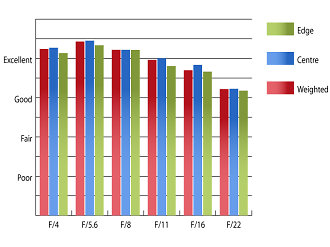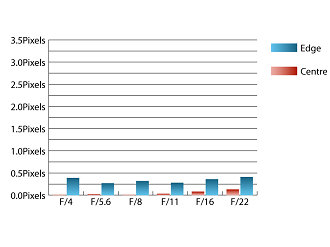Nikon AF-S NIKKOR 300mm f/4E PF ED VR Lens Review
Nikon NIKKOR 300mm f/4E PF ED VR Performance
During testing, this lens produced excellent sharpness across the frame from maximum aperture, improving a little when stopped down to f/5.6.
How to read our charts
The blue column represents readings from the centre of the picture frame at the various apertures and the green is from the edges. Averaging them out gives the red weighted column.The scale on the left side is an indication of actual image resolution. The taller the column, the better the lens performance. Simple.
For this review, the lens was tested on a Nikon D600 using Imatest.
Levels of chromatic aberrations are very well controlled, remaining comfortably below 0.5 pixel widths towards the edges of the frame. This low level of fringing should be pretty much impossible to spot in normal image taking, even with areas of high contrast towards the edges of the frame.
How to read our charts
Chromatic aberration is the lens' inability to focus on the sensor or film all colours of visible light at the same point. Severe chromatic aberration gives a noticeable fringing or a halo effect around sharp edges within the picture. It can be cured in software.Apochromatic lenses have special lens elements (aspheric, extra-low dispersion etc) to minimize the problem, hence they usually cost more.
For this review, the lens was tested on a Nikon D600 using Imatest.
Falloff of illumination towards the corners is typical for a lens of this type. At f/4 the corners are 1.85 stops darker than the image centre and visually uniform illumination is achieved with the aperture stopped down to f/6.3 or beyond.
Distortion is extremely well controlled with Imatest only being able to detect 0.748% pincushion distortion. This low level will be difficult to spot in normal photographs, but if you require absolutely straight lines, you'll be glad to find that the distortion pattern is uniform across the frame. This should make applying any corrections in image editing software reasonably straightforward.
Thanks to Nikon's Nano-crystal coating, this lens is unfazed by shooting into the light, producing good contrast in a wide range of conditions. A deep circular hood is supplied, which does a superb job of shading the lens from extraneous light that may cause issues.
Value For Money
If price alone is taken into consideration, you’d be forgiven for thinking that this lens offers poor value for money, especially as it costs around 70% more than its predecessor. When the features added to this lens, including Vibration Reduction, compact size and light weight are taken into consideration, this lens starts to look like a decent upgrade over the old lens, and may even tempt a few owners of the AF-S 300mm f/4 IF-ED to part with their cash.
Add your message
Please login here or if you've not registered, you can register here. Registering is safe, quick and free.
photodo Stats
428 MTF tests
74 in-depth photodo reviews
100+ users join each day
Help the lens community by reviewing or rating a lens today via our lens search
Latest Lens Reviews
- Chinon 28mm f/2.8 Vintage Lens Review
- Canon EF 70-200mm f/4L IS II USM Lens Review
- Samyang AF 85mm f/1.4 EF Review
- Sigma 70mm f/2.8 DG Macro Art Review
- Samyang AF 24mm f/2.8 FE Review
- Meike 50mm f/1.7 Review
- Tamron 70-210mm f/4 Di VC USD Review
- Lensbaby Burnside 35mm f/2.8 Review
- Asahi Super Takumar 50mm f/1.4 Review
- Asahi Super-Multi-Coated Takumar 135mm f/3.5 Review


